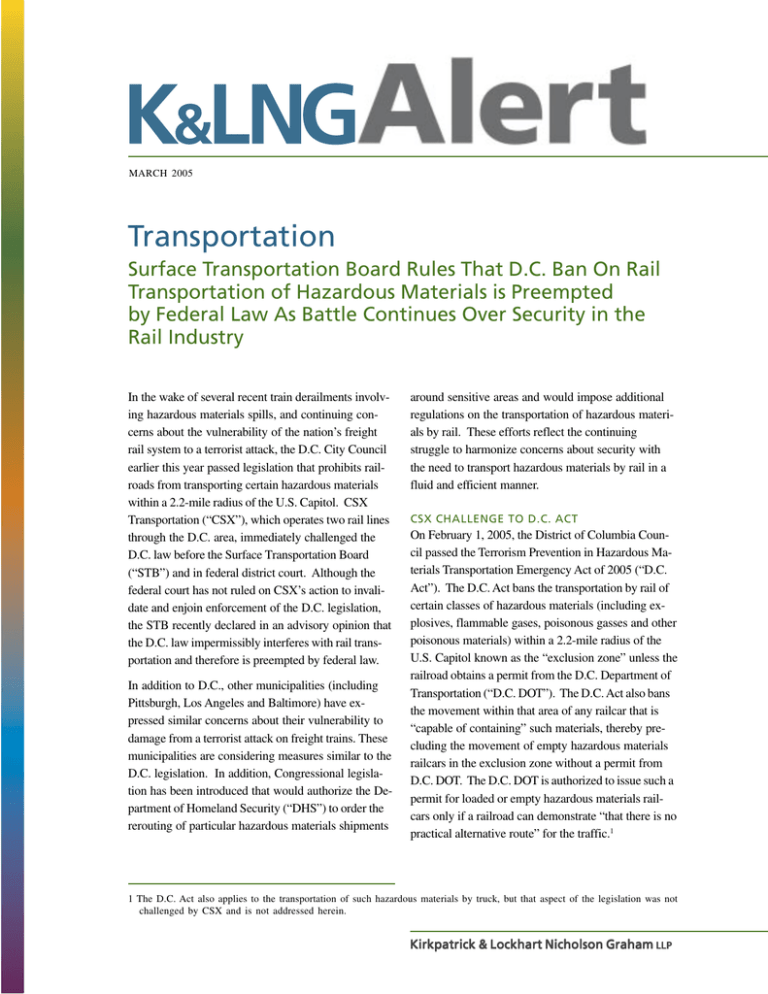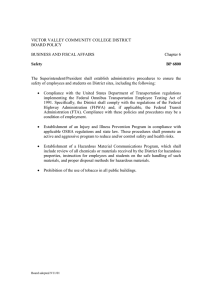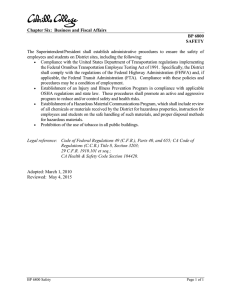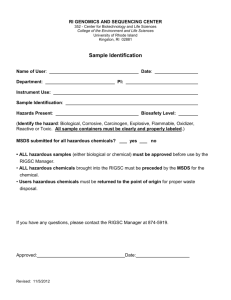
MARCH 2005
Transportation
Surface Transportation Board Rules That D.C. Ban On Rail
Transportation of Hazardous Materials is Preempted
by Federal Law As Battle Continues Over Security in the
Rail Industry
In the wake of several recent train derailments involving hazardous materials spills, and continuing concerns about the vulnerability of the nation’s freight
rail system to a terrorist attack, the D.C. City Council
earlier this year passed legislation that prohibits railroads from transporting certain hazardous materials
within a 2.2-mile radius of the U.S. Capitol. CSX
Transportation (“CSX”), which operates two rail lines
through the D.C. area, immediately challenged the
D.C. law before the Surface Transportation Board
(“STB”) and in federal district court. Although the
federal court has not ruled on CSX’s action to invalidate and enjoin enforcement of the D.C. legislation,
the STB recently declared in an advisory opinion that
the D.C. law impermissibly interferes with rail transportation and therefore is preempted by federal law.
In addition to D.C., other municipalities (including
Pittsburgh, Los Angeles and Baltimore) have expressed similar concerns about their vulnerability to
damage from a terrorist attack on freight trains. These
municipalities are considering measures similar to the
D.C. legislation. In addition, Congressional legislation has been introduced that would authorize the Department of Homeland Security (“DHS”) to order the
rerouting of particular hazardous materials shipments
around sensitive areas and would impose additional
regulations on the transportation of hazardous materials by rail. These efforts reflect the continuing
struggle to harmonize concerns about security with
the need to transport hazardous materials by rail in a
fluid and efficient manner.
CSX CHALLENGE TO D.C. ACT
On February 1, 2005, the District of Columbia Council passed the Terrorism Prevention in Hazardous Materials Transportation Emergency Act of 2005 (“D.C.
Act”). The D.C. Act bans the transportation by rail of
certain classes of hazardous materials (including explosives, flammable gases, poisonous gasses and other
poisonous materials) within a 2.2-mile radius of the
U.S. Capitol known as the “exclusion zone” unless the
railroad obtains a permit from the D.C. Department of
Transportation (“D.C. DOT”). The D.C. Act also bans
the movement within that area of any railcar that is
“capable of containing” such materials, thereby precluding the movement of empty hazardous materials
railcars in the exclusion zone without a permit from
D.C. DOT. The D.C. DOT is authorized to issue such a
permit for loaded or empty hazardous materials railcars only if a railroad can demonstrate “that there is no
practical alternative route” for the traffic.1
1 The D.C. Act also applies to the transportation of such hazardous materials by truck, but that aspect of the legislation was not
challenged by CSX and is not addressed herein.
Kirkpatrick & Lockhart Nicholson Graham LLP
On February 7, 2005, CSX filed a petition for an STB
order declaring that the D.C. Act is preempted by Section 10501(b) of the ICC Termination Act of 1995
(“ICCTA”), which gives the STB exclusive jurisdiction over transportation by rail carriers such as CSX
and the rates, rules, practices, routes, services and facilities of such carriers. Comments in support of
CSX’s petition were filed by the United States Department of Transportation (“U.S. DOT”), the Association
of American Railroads and various railroad and shipper interests (including producers and users of hazardous materials). The District of Columbia (“D.C.”)
and the Sierra Club filed replies in opposition to
CSX’s petition.2
In support of its petition, CSX argued that the D.C. Act
unreasonably burdens interstate commerce by requiring it to reroute hazardous materials shipments around
D.C. CSX claims that in many cases this rerouting
would add hundreds of miles and days of transit time
to hazardous materials shipments, and that the additional switching operations and intermediate car handlings necessitated by such rerouting would increase
congestion at its yards and could have a negative impact on its entire rail system (including the various
commuter rail services that operate over its system).
CSX stated that it is obligated as a common carrier to
accept hazardous materials shipments, that there are
comprehensive USDOT and Federal Railroad Administration (“FRA”) regulations governing the safety and
security of hazardous materials shipments, and that it
has been working with federal agencies since September 11, 2001 to implement enhanced security measures relating to its rail routes through D.C. CSX also
expressed concern that the D.C. Act would encourage
other local jurisdictions to enact similar measures, and
that the D.C. Act merely transfers the risks associated
with the transportation of hazardous materials to
other communities.
STB RULES IN FAVOR OF CSX
On March 14, 2005, the STB granted CSX’s petition
and declared that the D.C. Act is preempted by Section
10501(b) of ICCTA. The STB concluded that the D.C.
Act, by “[r]egulating when and where particular products can be carried by rail,” constitutes “direct regulation of a railroad’s activities” and therefore is preempted by Section 10501(b). The STB stated that, by
enacting Section 10501(b), Congress “broadly divested states and localities of a regulatory role over
rail transportation” and “foreclosed state or local
power to determine how a railroad’s traffic should be
routed.” The STB also noted that Section 10501(b) is
“intended to prevent a patchwork of local regulation
from unreasonably interfering with interstate commerce” and predicted that the D.C. Act “would likely
lead to further piecemeal attempts by other localities
to regulate rail shipments.”3
The STB, citing federal court precedent, rejected
D.C.’s argument that Section 10501(b) only preempts
direct “economic” regulation of railroads and not the
exercise of state or local police powers. Although the
STB noted that states may exercise their police powers
to the extent such powers do not unreasonably interfere with rail transportation, it concluded that the D.C.
Act “unreasonably interferes with interstate commerce” and contains a permitting process that is more
closely tied to the actual movement of rail traffic than
other local permitting and pre-clearance regimes that
previously have been found to be preempted by the
STB and the courts.
Finally, contrary to the argument advanced by D.C.
and the Sierra Club, the STB concluded that Section
10501(b) preemption applies to the D.C. Act even
though the USDOT and the DHS have primary jurisdiction over rail safety and security matters. The STB,
echoing comments filed by USDOT, stated that Congress has vested aspects of national rail oversight in
three different federal agencies (USDOT, DHS and the
2 Subsequent to the filing of its STB petition, CSX filed a petition in the United States District Court for the District of
Columbia seeking to have the D.C. Act declared invalid and also seeking a preliminary injunction to enjoin enforcement of
the D.C. Act.
3 In support of this prediction, the STB cited to a Traffic World article about Pittsburgh’s consideration of a similar ban on
the transportation of hazardous materials by rail.
2 MARCH 2005
KIRKPATRICK & LOCKHART NICHOLSON GRAHAM LLP
STB) and that such overlap does not lessen the preemptive effect of the STB’s jurisdictional reach under
Section 10501(b).4
EVENTS SUBSEQUENT TO STB DECISION
On March 23, 2005, D.C. filed a petition for reconsideration with the STB. D.C. argued that the STB essentially ignored its substantial interests in protecting
its citizens from the acknowledged threat of terrorism,
failed to make the necessary factual findings in support of its conclusion that the D.C. Act unreasonably
burdens interstate commerce and speculated without
foundation that other jurisdictions will adopt similar
prohibitions. It is very unlikely that the STB will reverse its position upon reconsideration.
As noted above, CSX also challenged the D.C. Act in
federal district court. A hearing on CSX’s challenge
was held on March 23, 2005. The court heard oral arguments but has not rendered a decision as of the
date of this publication. Many observers believe the
federal court is likely to strike down the D.C. Act as
an impermissible intereference with interstate commerce and as preempted by ICCTA, the Federal Rail
Safety Act and the Hazardous Materials Transportation Act.5 The STB did not consider the preemptive
effect of these latter two federal statutes, but the court
does have the authority to make such a determination
and is likely to find that the D.C. Act is preempted under one if not all three of the federal statutes that regulate rail transportation.
FEDERAL AND MUNICIPAL LEGISLATIVE
DEVELOPMENTS
Shortly after the D.C. Council approved its legislation, Rep. Edward Markey (D-MA) of the House Select Committee on Homeland Security reintroduced
federal legislation (H.R. 1414, the Extremely Hazardous Materials Transportation Security Act of 2005)
that would require DHS to impose additional security
requirements for shipments of certain hazardous ma-
terials, including the mandatory rerouting of such
shipments around areas that raise particular security
concerns when a safer route (as determined by DHS) is
available. Rep. Markey introduced similar legislation
in last year’s Congress and has stated that Sen. Jon
Corzine (D-NJ) will introduce similar legislation in the
Senate after the Easter recess.
H.R. 1414 would compel DHS to issue regulations
governing the shipping of “extremely hazardous material,” which is defined in the bill as: i) a material that
is toxic by inhalation; ii) a material that is extremely
flammable; iii) a material that is highly explosive; and
iv) any other material designated by DHS to be extremely hazardous. The regulations would require
DHS to reroute the transport of extremely hazardous
materials around densely populated or other sentitive
areas of particular interest to terrorists when a safer alternate route is available.
Additionally, H.R. 1414 would require: i) using physical security measures for shipments of extremely hazardous materials (such as extra security guards and increased use of surveillance technologies); ii) informing federal, state, and local law enforcement authorities before an extremely hazardous material is transported within, through, or near an area of concern; iii)
creating terrorism response plans for shipments of extremely hazardous materials; iv) using currently available technologies and systems to ensure effective
communication between extremely hazardous materials transporters and entities responsible for responding
to acts of terrorism involving extremely hazardous materials shipments; and v) providing training in transportation security for all individuals dealing with extremely hazardous materials shipments and emergency
response personnel. The only material difference between H.R. 1414 and the version introduced last year
is a requirement that DHS report to Congress on the
risk and security of shipments of extremely
hazardous materials.
4 The STB noted that its declaratory order decision only addresses the preemptive effect of Section 10501(b) and that the
preemptive effect of other federal statutes is more properly addressed by the agencies that administer those statutes (i.e.,
USDOT or DHS) or the federal district court.
5 Although the context of this case involves concerns about terrorism, the concept of lawsuits by localities or even states to
prevent the movement of a variety of hazarardous materials through their jurisdictions is not new. New Jersey v. Long
Island Power Authority, 30 F.3d 403 (3rd Cir 1993) (New Jersey rebuffed in effort to halt transfer of nuclear fuel from
New York to Pennsylvania via barge along its coast).
3 MARCH 2005
KIRKPATRICK & LOCKHART NICHOLSON GRAHAM LLP
The rerouting provision of H.R. 1414 is likely to be
the most controversial aspect of the proposed legislation and its companion Senate bill. The railroad industry and its customers are likely to argue, as CSX
and others did in the STB proceeding, that the mandatory rerouting of hazardous materails shipments will
result in increased costs, increased congestion and unwarranted interference in the operations of interstate
railroads. In addition, the opponents of the proposed
legislation are likely to argue that the rerouting proposal merely shifts the risks to other communities, and
that rerouting may only serve to increase risks by extending the time during which the materials are being
transported. Although the proposed legislation is unlikely to be enacted in its present form, certain aspects
of the legislation (such as the DHS reporting requirements and the emergency responder training and coordination requirements), to the extent that such requirements do not unnecessarily duplicate existing requirements, have a more likely chance of being enacted
into law.
In addition to the activities on Capitol Hill, various
municipalities have indicated an interest in proposing
legislation to ban the routing of hazardous materials
shipments by rail through their communities. For example, certain members of the Pittsburgh City Council
have indicated that they might introduce similar legislation if the D.C. ban is upheld by the STB or the
courts. The concern in Pittsburgh is driven in part by
a recent Norfolk Southern derailment that resulted in a
chemical release (but no casualties) near the Allegheny River. At this point, it appears unlikely that the
D.C. ban will be enforced and therefore the prospect of
having similar legislation enacted in other municipalities appears to be minimal. However, it is possible that
municipalities with continuing concerns about the security of rail transportation of hazardous materials
might consider some lesser form
of regulation.
4 MARCH 2005
CONCLUSION
Although the legality of the D.C. ban on the transportation of hazardous materials by rail remains pending
before the federal district court, the STB has issued its
advisory opinion that the legislation is preempted by
federal law. The STB is unlikely to reverse its position
on reconsideration, and the federal court is likely to
agree with the STB’s position that the D.C. legislation
is an impermissible interference with interstate commerce. However, even if municipal efforts to regulate
the rail transportation of hazardous materials are stymied by the courts, there is pending federal legislation
that would give DHS the authority to reroute such
shipments of hazardous materials on a national basis
pursuant to certain security-related standards. The
railroad industry and its customers will vigorously oppose any such effort to regulate their routing authority.
The final outcome of this continuing struggle to harmonize security concerns with the railroad industry’s
interests in maintaining a fluid and efficient rail network may lie in a compromise that imposes certain additional training, communications and other reporting
and coordination requirements on rail carriers that
transport hazardous materials in sensitive areas.
Edward J. Fishman
efishman@klng.com
202.778.9456
Tracie D. Spear
tspear@klng.com
202.778.9390
KIRKPATRICK & LOCKHART NICHOLSON GRAHAM LLP
FOR FURTHER INFORMATION, please consult one of the lawyers listed below:
Boston
Harrisburg
Pittsburgh
Washington
Jeffrey S. King
Carleton O. Strouss
Theodore A. McConnell
Kevin M. Sheys
Edward J. Fishman
Tracie D. Spear
Barry M. Hartman
617.261.3179
717.231.4503
412.355.6566
202.778.9290
202.778.9456
202.778.9390
202.778.9338
jking@klng.com
cstrouss@klng.com
tmcconnell@klng.com
ksheys@klng.com
efishman@klng.com
tspear@klng.com
bhartman@klng.com
www
.klng.com
www.klng.com
BOSTON
■
DALLAS
■
HARRISBURG
■
LONDON
■
LOS ANGELES
■
MIAMI
■
NEWARK
■
NEW YORK
■
PITTSBURGH
■
SAN FRANCISCO
■
WASHINGTON
Kirkpatrick & Lockhart Nicholson Graham (K&LNG) has approximately 950 lawyers and represents entrepreneurs, growth and middle market companies and leading FORTUNE 100 and
FTSE 100 global corporations in every major industry, nationally and internationally.
K&LNG is a combination of two limited liability partnerships, each named Kirkpatrick & Lockhart Nicholson Graham LLP, one qualified in Delaware, U.S.A. and practicing from offices in
Boston, Dallas, Harrisburg, Los Angeles, Miami, Newark, New York, Pittsburgh, San Francisco and Washington and one incorporated in England practicing from the London office.
This publication/newsletter is for informational purposes and does not contain or convey legal advice. The information herein should not be used or relied upon in regard to any particular facts
or circumstances without first consulting a lawyer.
Unless otherwise indicated, the lawyers are not certified by the Texas Board of Legal Specialization.
Data Protection Act 1998 - We may contact you from time to time with information on Kirkpatrick & Lockhart Nicholson Graham LLP seminars and with our regular newsletters, which may
be of interest to you. We will not provide your details to any third parties. Please e-mail cgregory@klng.com if you would prefer not to receive this information.
© 2005 KIRKPATRICK & LOCKHART NICHOLSON GRAHAM LLP. ALL RIGHTS RESERVED.




